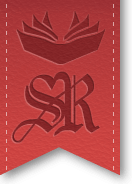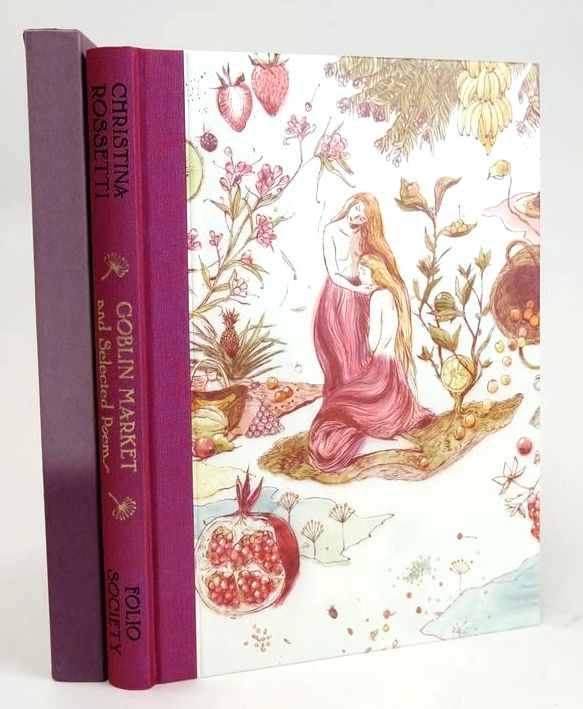Goblin Market by Christina Rossetti
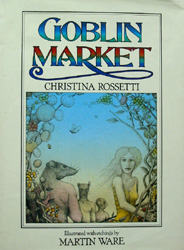 Goblin Market - a familiar title but a poem that I knew only from my interest in the books illustrated by Arthur Rackham, of which Goblin Market is one. Having decided to write an article featuring this book I thought perhaps I'd better read the poem in its entirety. And what a surprise awaited me!
Goblin Market - a familiar title but a poem that I knew only from my interest in the books illustrated by Arthur Rackham, of which Goblin Market is one. Having decided to write an article featuring this book I thought perhaps I'd better read the poem in its entirety. And what a surprise awaited me!
Goblins - the very word conjures up images of fairy tales, mythical little creatures, magical happenings. Goblin Market, published in 1862 and the longest of Christina Rossetti's poems, has enjoyed a reputation as one of the finest of children's poems and indeed Christina herself insisted that it was simply a fairy tale. However, the sensuous language used in the lengthy descriptive passages does give a somewhat different impression. But more of that later...
So what is Goblin Market about? Essentially it is the story of two beautiful golden-haired sisters, Laura and Lizzie, who every day, morning and evening, hear the cries of the Goblins selling their wares - beautiful, ripe, delicious fruits:
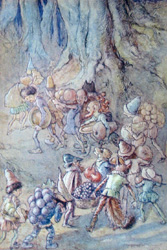 "Plump unpeck'd cherries,
"Plump unpeck'd cherries,
Melons and raspberries,
Bloom-down-cheek'd peaches,
Swart-headed mulberries,
Wild free-born cranberries,
Crab-Apples, dewberries,
Pine-apples, blackberries,
Apricots, strawberries...
Currants and gooseberries,
Bright-like-fire barberries,
Figs to kill your mouth,
Citrons from the South.
Sweet to tongue and sound to eye;
Come buy, come buy."
Who could resist? Remembering what had happened to Jeannie, who had succumbed to the Goblin's charms, Lizzie implores her sister:
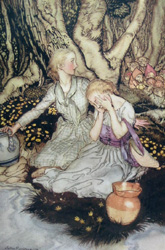 "Laura, Laura,
"Laura, Laura,
You should not peep at goblin men..."
"Their offers should not charm us,
Their evil gifts would harm us."
She thrust a dimpled finger
In each ear, shut eyes and ran:
Curious Laura chose to linger..."
There follows a marvellous description of the goblins:
One had a cat's face,
One whisked a tail,
One tramped at a rat's pace,
One crawled like a snail,
One like a wombat prowled obtuse and furry,
One like a ratel tumbled hurry-scurry.
Lizzie heard a voice like voice of doves
Cooing all together:
They sounded kind and full of loves
In the pleasant weather.
Below right: Illustration by Laurance Housman
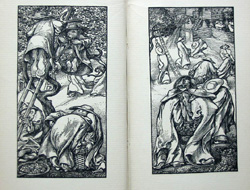 Laura stared but did not stir,
Laura stared but did not stir,
Longed but had no money:
The whisk-tailed merchant bade her taste
In tones as smooth as honey,
The cat-faced purr'd,
The rat-paced spoke a word
Of welcome, and the snail-paced even was heard;
One parrot-voiced and jolly
Cried "Pretty Goblin" still for "Pretty Polly";
One whistled like a bird.'
So poor Laura is mesmerised and the temptation is just too much for her to bear. But she has no money! What to do? No problem - the Goblins will accept a 'golden curl' in payment and Laura
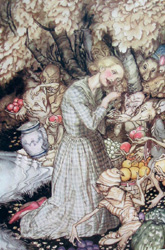 "clipped a precious golden lock,
"clipped a precious golden lock,
She dropped a tear more rare than pearl,
Then sucked their fruit globes fair or red:
Sweeter than honey from the rock,
Stronger than man-rejoicing wine,
Clearer than water flowed that juice;
She never tasted such before..."
Right: Illustration by Arthur Rackham
When Laura finally returns home Lizzie meets her at the gate "full of wise upbraidings". Lizzie reminds Laura of what had happened to Jeanie who sadly also partook of the Goblins' fruit -
"She pined and pined away;
Sought them by night and day,
Found them no more, but dwindled and grew grey;
Then fell with the first snow,
While to this day no grass will grow
Where she lies low:
But Laura has no regrets and indeed, to Lizzie's consternation, intends to return the next evening:
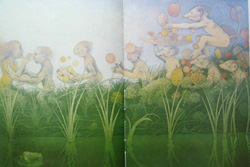 "Nay, hush," said Laura:
"Nay, hush," said Laura:
"Nay, hush, my sister:
I ate and ate my fill,
Yet my mouth waters still;
To-morrow night I will
Buy more;"
Right: illustrationby Martin Ware
The following day sees the sisters going about their daily routine - milking the cows, churning butter, kneading cakes, but - there is a subtle change: 'One warbling for the mere bright day's delight, One longing for the night.'
When evening comes they both go down to the brook to draw water. As the sun sets Lizzie is anxious to go home but
"Laura loiter'd still among the rushes
And said the bank was steep.
And said the hour was early still
The dew not fall'n, the wind not chill;
Listening ever, but not catching
The customary cry,
"Come buy, come buy," "
When Laura realizes that her sister can hear the Goblins' cry but that she can neither hear them nor see them, she wonders if she has gone deaf and blind! She trudges home, creeps to bed and when Lizzie is asleep - she weeps, as if her heart would break.
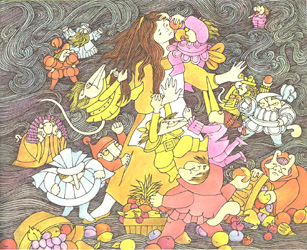 And now we see Laura, day after day, night after night, sitting, watching in vain for the Goblin men. Her hair grows thin and grey, she doesn't eat, she is gradually fading away. Then, when 'Laura dwindling seem'd knocking at Death's door: ' Lizzie makes a decision - she puts a silver penny in her purse, kisses Laura, goes to the brook at twilight and 'For the first time in her life Began to listen and look.'
And now we see Laura, day after day, night after night, sitting, watching in vain for the Goblin men. Her hair grows thin and grey, she doesn't eat, she is gradually fading away. Then, when 'Laura dwindling seem'd knocking at Death's door: ' Lizzie makes a decision - she puts a silver penny in her purse, kisses Laura, goes to the brook at twilight and 'For the first time in her life Began to listen and look.'
Left: illustration by Ellen Raskin
What a sight greeted her! 'Laugh'd every goblin When they spied her peeping: Came towards her hobbling, Flying, running, leaping, Puffing and blowing, Chuckling, lapping, crowing, Clucking and gobbling, Mopping and mowing, Full of airs and graces, Pulling wry faces, Demure grimaces, Cat-like and rat-like, Ratel- and wombat-like, Snail-paced in a hurry, Parrot-voiced and whistler, Helter skelter, hurry skurry, Chattering like magpies, Fluttering like pigeons, Gliding like fishes, - Hugg'd her and kiss'd her: Squeez'd and caress'd her: Stretch'd up their dishes, Panniers, and plates: "Look at our apples Russet and dun, Bob at our cherries, Bite at our peaches, Citrons and dates, Grapes for the asking, Pears red with basking Out in the sun, Plums on their twigs; Pluck them and suck them, Pomegranates, figs."'
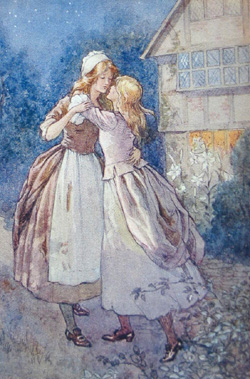 But, remembering what had happened to Jeanie, Lizzie requests that the Goblins give her the fruit to take back to Laura. When she refuses to eat the fruit there and then, suddenly, there is a dramatic change - the Goblins are angry!
But, remembering what had happened to Jeanie, Lizzie requests that the Goblins give her the fruit to take back to Laura. When she refuses to eat the fruit there and then, suddenly, there is a dramatic change - the Goblins are angry!
'They began to scratch their pates, No longer wagging, purring, But visibly demurring, Grunting and snarling. One call'd her proud, Cross-grain'd, uncivil; Their tones wax'd loud, Their look were evil. Lashing their tails They trod and hustled her, Elbow'd and jostled her, Claw'd with their nails, Barking, mewing, hissing, mocking, Tore her gown and soil'd her stocking, Twitch'd her hair out by the roots, Stamp'd upon her tender feet, Held her hands and squeez'd their fruits Against her mouth to make her eat.'
But Lizzie resists. The Goblins become even more enraged:
'Though the goblins cuff'd and caught her, Coax'd and fought her, Bullied and besought her, Scratch'd her, pinch'd her black as ink, Kick'd and knock'd her, Maul'd and mock'd her, Lizzie utter'd not a word; Would not open lip from lip Lest they should cram a mouthful in: But laugh'd in heart to feel the drip Of juice that syrupp'd all her face, And lodg'd in dimples of her chin, And streak'd her neck which quaked like curd.'
Right: Illustration by Margaret W. Tarrant
At last the Goblins give up. Worn out by Lizzie's resistance they disappear, one by one, without a sound. Lizzie, covered in juice from the fruit, returns home to Laura.
'She cried, "Laura," up the garden, "Did you miss me? Come and kiss me.Never mind my bruises, Hug me, kiss me, suck my juices Squeez'd from goblin fruits for you, Goblin pulp and goblin dew. Eat me, drink me, love me; Laura, make much of me; For your sake I have braved the glen And had to do with goblin merchant men."'
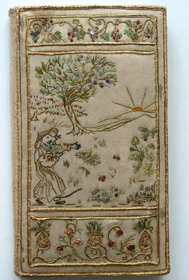
As mentioned at the start of this article, the language used in the lengthy descriptive passages have led many to conclude that the poem, far from being a fairy tale for children, is an allegory in which the fruits offered by the goblins stand for the pleasures of the world. Certainly, as I read the poem, I was reminded of the Biblical account of the Garden of Eden and the temptation and downfall of Eve. Some have even suggested that Lizzie portrays Christ in his role as Redeemer, which is not so far-fetched when one considers that Christina was a devout Christian and much of her poetry was inspired by her religion.
Left: beautiful embroidered copy
In a review published in Macmillan's Magazine of September 1863, Caroline Norton wrote that the poem "is one of the works which are said to 'defy criticism.' Is it a fable - or a mere fairy story - or an allegory against the pleasures of sinful love - or what is it?" These comments also reflect modern criticism and, indeed, many modern readers may make a connection between the temptations and effect of the fruit on Laura, with the effects of the use of narcotic drugs. However, whatever Christina Rossetti's original intent, it is a fact that Goblin Market continues to perplex and inspire readers today.
But, I hear you ask, what did happen to Laura in the end?
I will leave you to read the poem yourself to find out - I hope you enjoy it as much as I did.
Contributed by Chris Tomaszewski
(Published on 8th Dec 2014 )
